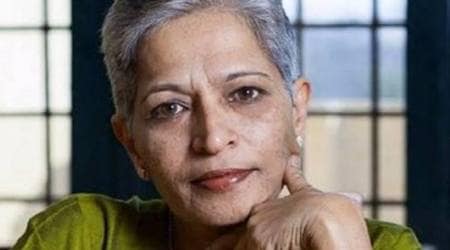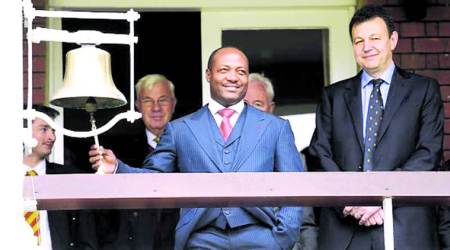 Police outside journalist Gauri Lankesh’s residence in Bengaluru on Tuesday. PTI
Police outside journalist Gauri Lankesh’s residence in Bengaluru on Tuesday. PTI
Members of the literary community spoke out strongly against the murder of senior journalist Gauri Lankesh, calling it an attempt to “silence those who believe in democracy and decency”. Tamil writer Perumal Murugan, who was hounded into silence in 2015 by protests against his work, said, “One thought that this sort of sentiment had died down. This incident proves that the climate of hatred and intolerance seems to be alive. We need to respond to this attack with awareness and continued diligence.”
Historian Ramachandra Guha said Lankesh’s murder was “part of a pattern that links the deaths of (Narendra) Dabholkar, (M M) Kalburgi and (Govind) Pansare”. “The climate of hate and intolerance that has been promoted by this current (BJP) government, aided by television channels and freelance goondas, is complicit in this murder. It is chilling. We are becoming mirror images of Bangladesh and Pakistan, where writers are killed for what they say. This is an attempt to silence all of us, all of those who believe in democracy and decency.”
Malayalam poet K Satchidanandan called it “murder of democracy”. “Any bold and independent dissenter can now become the target of fascists. We need to develop a zero-tolerance policy towards such dastardly acts. This is the fourth murder in a series and now any dissenter could become a target. It is high time all lovers of freedom and democracy come together on a common platform,” he said.
Writer and linguist Ganesh Devy, who now lives in Dharwad, also said he believed Lankesh’s murder was linked to the assassinations of Dabholkar, Pansare and Kalburgi. “This monstrous shadow of fascist forces now looms over the lives of everyone here,” he said.
Kannada writer Vivek Shanbhag said the murder of the anti-establishment journalist was a clear message: “to shut up”. “She has been very critical of what has been happening in our society, what is happening around us. She was not partial in her criticism… She was always against those who committed atrocities and for the downtrodden. She was a fearless journalist. And this is a shameful act for all of us. What kind of society have we become?”
Many remembered Lankesh as an equal opportunity offender and exceptionally bold woman. “She was the daughter of (Kannada poet, writer, journalist and playwright) P Lankesh, one of the most outspoken people in Karnataka. She inherited that courage and fearlessness. She was a journalist but also an activist,” said Devy.
“It is not easy to be a woman, an activist and a fearless person in this country,” said theatreperson Arundhati Nag, a friend of Lankesh. “She was a strong social and political voice, and this is what we need — people who can speak out. This is not how you deal with someone who is anti-establishment.”
Guha too believed that Lankesh earned the ire of the extremist right-wing, “which is particularly offended by independent women”.
Critic and translator Chandan Gowda, who teaches at Azim Premji University, Bengaluru, and who knew Lankesh well, said she often received threats for her work. “Over the years, she had grown indifferent to them. She was deeply concerned and critical of the growth of right-wing Hindutva,” he said. Gowda said he remembered her as a “fabulous force, an extremely warm and giving person”. “It was impossible not to like her,” he said.
S Anand, publisher of the anti-caste imprint Navayana, recalled how eager Lankesh was to publish a Kannada translation of D N Jha’s The Myth of the Holy Cow when the BJP was in power in Karnataka. “She was always up for a challenge and took on everyone. This is clearly an execution, but someone else is pulling the trigger. They killed her so easily,” he said.

